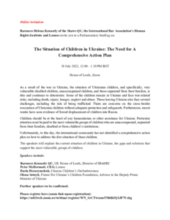This country page features an interactive, icon-based data dashboard providing a national-level overview of the status of children’s care and care reform efforts (a “Country Care Snapshot”), along with a list of resources and organizations in the country.
demographic_data
childrens_living_arrangement
children_living_without_bio
key_stakeholders
Key Stakeholders
Add New Datadrivers_of_institutionalisation
Drivers of Institutionaliziation
Add New Datakey_research_and_information
Key Data Sources
Add New DataCall to Action: Building a rights-based child protection system in Ukraine, free from institutions
Country Care Review: Ukraine
Prevalence and number of children living in institutional care: global, regional, and country estimates
Displaying 141 - 150 of 393
Coverage of the conflict in Ukraine has been a stark reminder of the pace and extent to which war turns lives upside down. The terrifying experience of conflict sees people turning to loved ones and places that are familiar and comforting. Children are no different. And yet, even before the war in Ukraine started on 24 February, for over 100,000 Ukrainian children the familiar wasn’t a family environment, but an institution.
In July, Russian mortars rained down on a psychiatric home in northern Ukraine, while dozens of elderly and disabled residents were sleeping.
Flames soon swept through the facility’s dining room, and its dormitory and administration buildings were wrecked. Miraculously, only three people were injured. But it marks the latest in a series of deadly attacks in which some of Ukraine’s most vulnerable have been caught up in a savage conflict far beyond their control.
There was nothing obviously untoward about the woman who approached the Palanca border crossing between Ukraine and Moldova with a 15-year-old boy she said was her nephew. But something about the pair just seemed odd. The boy, in particular, appeared embarrassed and uncomfortable.
There was nothing obviously untoward about the woman who approached the Palanca border crossing between Ukraine and Moldova with a 15-year-old boy she said was her nephew. But something about the pair just seemed odd. The boy, in particular, appeared embarrassed and uncomfortable.
The Ukrainian ambassador to the U.S. claims hundreds of thousands of Ukrainians, including children, are being forcefully deported to Russia.
Vasyl Velychko has been tied to a bench on a baking hot day for hours, but no-one hearing his screams will untie him. The 18-year-old is one of thousands of disabled people living in Ukraine's orphanages. BBC News has gained access to five institutions and found widespread abuse and mistreatment - including teenagers restrained and adults left lying in cots for years.
Ukrainians fleeing war in their homeland found open arms across the West. But for many, reaching the United States proved to be an arduous journey charged by border politics.
Some, like Maxim Blyzniuk and Oksana Ilchishena arrived in Mexico and made it across the border with their families into the United States, only to encounter hardship on the other side. Others, like Inna Dunai, a mother of five, flew across an ocean only to find the U.S. border shut — leaving them trapped in an unfamiliar foreign country, confused and disillusioned.
"The kids here need more attention. We need staff, staff, staff." This is the plea from Mykhailo Zaidel, the director of an Ukrainian orphanage which is struggling to cope after the war sent it an influx of children. The Magala orphanage was caring for 10 children with learning disabilities before Russia invaded on 24 February. It is around 1,000 miles from the frontline but the war has cast a long shadow.
Children should be at the heart of any humanitarian or other assistance for Ukraine. Particular attention must be paid to the most vulnerable groups of children who are unaccompanied, separated from their families, disabled or from children’s institutions. Unfortunately, to this day, the international community has not identified a comprehensive action plan on how to address the dire situation of these children. The speakers will explain the current situation of children in Ukraine, the gaps and solutions that support the most vulnerable groups of children.
US Secretary of State Antony Blinken has called on Russia to stop forced deportations and "filtration" operations involving Ukrainians. Russia had detained and forcibly moved to Russia some 900,000 to 1.6 million people, many of them children, he said.

